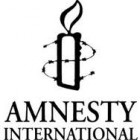DOCUMENT – LIBERIAN POLICE MUST TAKE IMMEDIATE ACTION TO PROTECT JOURNALIST
AMNESTY INTERNATIONAL
PUBLIC STATEMENT
13 March 2012
Liberian Police Must Take Immediate Action to Protect Journalist
Mae Azango, an investigative journalist based in Monrovia, is receiving death threats after publishing a story in FrontPage Africa uncovering the practice of female genital mutilation of girls [FGM] in Liberia.
Amnesty International welcomes the news that the Liberian National Police (LPN) have today told Mae Azango that they will launch an investigation and have begun to contact witnesses. Amnesty International urges them to ensure that those responsible are brought to justice; and to take immediate action to protect Mae Azango and her children from threats and harassment.
On Thursday 8 March 2012, after publishing an article exposing the initiation of girls under the age of 18 into the “Sande Society”, a secret society where girls are forced to undergo female genital mutilation, Mae began receiving death threats. Mae Azango’s editor has also been receiving threats on her behalf. Mae Azango says, “They called my editor to warn me that they will get me” she adds, “there are certain things women are not allowed to do. There are some things, they say, that women are not supposed to expose. They are angry because I wrote about FGM.”
One threat came from a tenant in her own home and as a result she has been unable to sleep in her house since Thursday 8 March. According to Mae Azango “A lady living in my house threatened me, that is why I don’t sleep [at] home because I don’t know how far she would go in harming me,”I fear for their safety [of my children].”
On Tuesday 13 March, six days after she was forced into hiding, the police informed Mae Azango that they would launch an investigation after she provided the numbers for some witnesses.
Mae Azango has previously written articles on human rights issues such as police brutality, sexual harassment and rape. She is now facing death threats for her work on FGM. In November 2011, Mae won a prestigious US-based Pulitzer Grant to continue her work on reproductive health issues.
Mae Azango’s story is not an isolated incident. Journalists and human rights defenders in Liberia frequently face harassment, and at times threats, arrests and assaults, for work on corruption, criticism of the government and covering controversial issues such as lesbian, gay, bisexual and transgender (LGBT) people’s rights and FGM.
The Liberian government must ensure that journalists and human rights defenders can carry out their work without interference, obstacles, discrimination or fear of retaliation. Amnesty International is calling on the Liberian National Police to take immediate action to protect Mae Azango and her children from threats and harassment.
Despite Liberia’s international obligations to protect girls from genital mutilation, the practice is wide-spread. According to the Liberian Children‘s Law passed February 2012, Article 6 Section 4 guaranteed that children should not be subjected to “any unnecessary or uncultured practice that may inflict physical, psychosocial, or emotional pain to the child or otherwise violate or endanger her or his bodily integrity, life, health, dignity, education, welfare or holistic development.” Amnesty International is concerned that the ambiguous wording of “unnecessary or uncultured practice” has the potential to prove ineffective in ending the practice of FGM.
According to Demographic and Health Survey in 2007, 58.2% of girls between the ages of 15 and 49 are subjected to FGM in Liberia. Amnesty International has heard reports of girls between the ages of eight and 18, some as young as three, forced to undergo the procedure without anaesthesia or sterile equipment.
HYPERLINK “http://www.prb.org/pdf10/fgm-wallchart2010.pdf” http://www.prb.org/pdf10/fgm-wallchart2010.pdf

